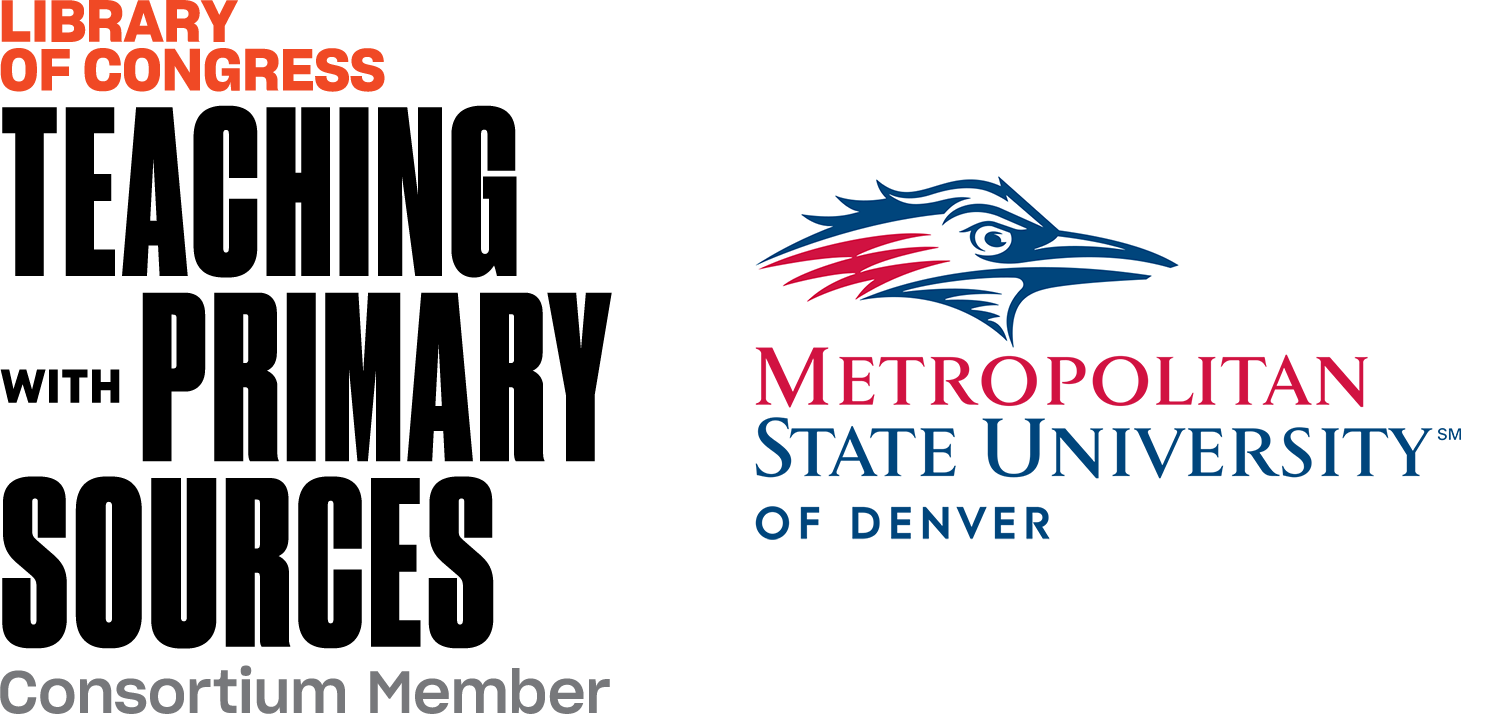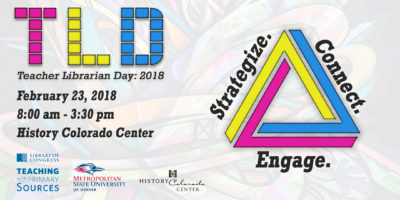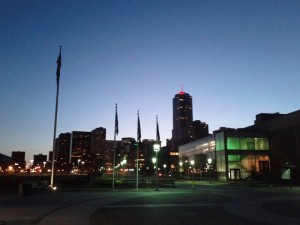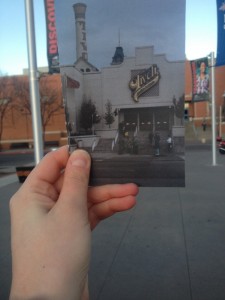Teaching with Primary Sources Western Region at MSU Denver hosted the 14th annual Teacher Librarian Day at the History Colorado Center on February 23rd. The 14th TLD came with a few logistical changes, and from preliminary reports, it was a huge success!
This year we were fortunate to have Lee Ann Potter, Director of Educational Outreach at the Library of Congress, deliver the keynote. Her enlightening presentation opened our eyes to the possibilities of utilizing primary sources of all kinds. One of the most interesting bits of information was about what happened on same day as TLD, February 23, 1940: Woody Guthrie composed the iconic song, “This Land is your Land“.
Our speakers this year were diverse in knowledge, backgrounds, and classroom expertise. A link to each of the speaker’s presentations and breakout sessions (if available) are listed below, with the full schedule here.
Keynote:
Lee Ann Potter – It’s Good to Know!
Lee Ann Potter’s inspiring presentation highlighted the importance and relevance of the Library of Congress’ resources that are available for free on loc.gov. She reminded us that primary sources are powerful teaching tools that help us formulate knowledge that turns into wisdom. No matter how we answer the question of, “How do we know what we know?” for our students, analyzing primary sources creates an engaging avenue to build student’s critical thinking and reasoning skills.
Speakers and Breakouts:
TPS Western Region – Welcome to the TPS Family
The TPS Western Region highlighted some of the projects we have done in Colorado as well as throughout the Western Region, including Alaska, Hawaii, and the Western United States. Each grantee, university, grantee, school, and individual educator we have worked with has inspired us to become better educators by continuing to create innovative ways to use primary sources in a variety of diverse learning atmospheres.
Michelle Pearson and Rolly Schendel – Primary Passion
Michelle Pearson and Rolly Schendel put passion in perspective with purpose. Their stories about how we as educators impact the lives of our students, as well as the personal testimony from their own students, illuminated the importance of our often thankless jobs. By engaging with our students using the classroom activities they presented in their breakout session, our work helps to create meaning for our students.
Sarah Hurd – Travel and Tacos… and Questions?
Sarah Hurd brought geography to life with purpose by showing us how geography isn’t just about state capitals, but is all around us and we interactive with the geographical elements of location, place, human environment interaction, movement, and regions every day. “Who knew that geography was so physical?” she asks, “Successful geographic inquiry involves the willingness to ask, speculate on, and answer geographic questions about why things are, where they are, and how they got there.”
Stevan Kalmon – Teacher to Teacher
Stevan Kalmon gave us the theories and reasoning behind the importance of critical thinking. How do we as citizens critically think and what does that mean anyway? Today’s classroom must entail student voice, choice, time for reflection, opportunities for innovation, critical thinking, problem solving and problem finding, self assessment, and connected learning. Whether inside or outside of the classroom, being able to analyze, interpret, and draw conclusions from visual, textual, oral, and other types of arguments is essential to a quality education.
Kariann Yokota – Finding “Identity” in the Archives: Texts and Objects in Historical Analysis
Kariann Yokota showed us how identity can present itself in both text and objects during historical analysis. Focusing on the research surrounding her book, Unbecoming British: How Revolutionary America Became a Postcolonial Nation, she reminded us about how physical artifacts can help us understand the minds of historical people and the decision making and identity forming process of historical cultures.
Kenn Bisio – Forty Years of Photojournalism in Twenty Photographs
Kenn Bisio’s primary source talk focused on the photojournalist’s point of view of how primary source photographs are created. We often don’t consider the creation of primary sources, instead focusing on the historical context and content, but Kenn reminded us that often those who create primary sources are those that understand the importance the best.
Angel Vigil – The Fable of the First Story Ever Told – The Primary Source
Angel Vigil’s presentation needed no slideshow as he is a storyteller at heart. His forte for storytelling, however, didn’t come to him without purpose. He helped us understand and remember that we, as educators, mothers, fathers, brothers, and sisters, are the original primary source. Check out his website here.
History Colorado Breakouts:
Julie Peterson and James Peterson – Zoom In: The Centennial State in 100 Objects
The new exhibit at History Colorado, Zoom In: The Centennial State in 100 Objects, was led by exhibit creators Julie Peterson and James Peterson. They delivered a walkthrough of the exhibit and helped us understand why and how those 100 objects were chosen. Certainly purposeful, and certainly meaningful, each of these 100 objects created an illustrative view of Colorado History.
Sarah Gilmore – The Hart Research Library
The Hart Research Library breakout was hosted by Sarah Gilmore. Their incomparable collection of archives, photographs, and artifacts are perfect hands-on resources for your classroom.
[foogallery id=”4171″]
TLD 2018 was another successful professional development opportunity and we are grateful for all of the speakers, breakout presenters, and educators for coming to share this day with us. Also a HUGE thank you to Lessons on Local Government, History Colorado, Colorado National History Day, Rocky Mountain PBS, Colorado Encyclopedia, Digital Public Library of America, Stanford History Education Group, Institute for Innovation in Education, and ThinkBoard for donating all of the amazing resources and giveaways items.
Keep an eye on your email for next year’s TLD, which will happen in February. We can’t wait to see you all again next year!





